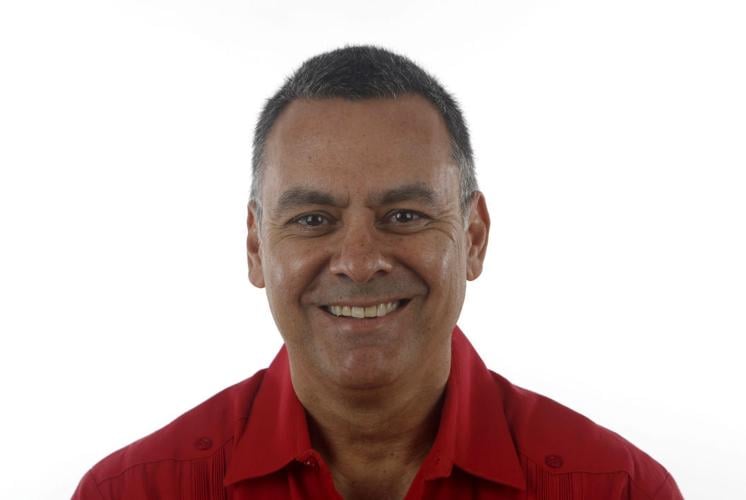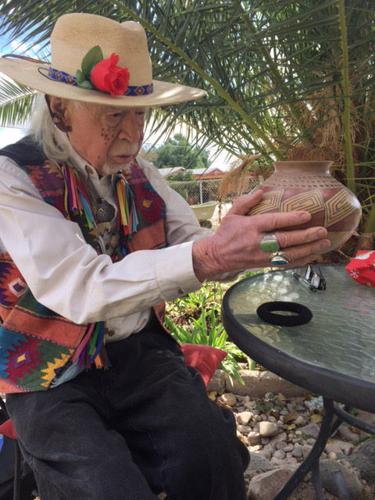In the world of the Aztecs, the pochteca occupied a revered status. The pochteca was a trader who traveled throughout the Mesoamerica empire and beyond, exchanging goods.
The trader was valued not only for the goods that he brought back but the knowledge about other people and their customs that the pochteca shared with his people.
Tito Carrillo is a modern-day pochteca.
In his travels to Mexico, to the small indigenous villages in Sonora, Chihuahua and other states, Carrillo returned with artistic works. But of most value are the friendships that he made with artists, dancers and people who accepted Carrillo was one of them.
And for more than 30 years, Carrillo introduced people from the Mayo, Yaqui and Tarahumara communities to his hometown of Tucson. From the state of Chihuahua, which borders Texas, Carrillo brought pottery from Mata Ortiz. From deep in Sonora, Carrillo brought Mayo arts and crafts, and from the land of the Yaqui, along the Yaqui River between Guaymas and Ciudad Obregón, he helped reunite Pascola dancers with their cousins in Tucson’s Yoeme communities in Old and New Pascua, Barrio Libre in South Tucson and Marana.
“They saw that my heart was with them,” Carrillo said.
Carrillo, who in October turned 79, is in ailing health but his spirit remains strong. On Christmas Eve morning, I visited him, his wife, Elma, and his son, Pablo, at Carrillo’s south-side home near West Ajo Way and Interstate 19.
It was in the early 1980s that Carrillo began to travel to Mexico. The history and culture had interested him for many years before he commenced his journeys. He had grown up in Tucson in an extended Mexican-American family, but his indigenous spirit pulled him to explore outside his world in his blue van, affectionately called Tortuga.
As a result of this travels, Carrillo and his wife, and later with their son, began selling indigenous art in Tucson and started a touring business, taking visitors to Mata Ortiz. As the popularity of Mata Ortiz grew, Carrillo took the pottery to the East Coast and New England.
It was not a one-way relationship that Carrillo had with the people in the Mexican villages. He brought clothes and toys for the children. He helped in ways that he could.
His son, a special-education teacher in a Tohono O’odham village south of Sells, said he describes his father’s commitment to others through the words of labor leader César Chávez.
“It is my true belief that only by giving do we truly receive,” said Pablo.
Even before Carrillo began his cultural excursions to Mexican indigenous communities, he was deeply involved with the Yaqui community in South Tucson.
In the ’70s, Carrillo worked with the Safford Area Council, as part of the Model Cities program, an anti-poverty effort left over from the ’60s. The council’s purpose was to represent and assist low-income families in South Tucson and neighboring Tucson barrios.
But Yaqui families living in the council’s area were ignored, Carrillo said. He worked to change that by organizing Yaqui families and getting them a seat at the table.
About the same time, he helped the Yaqui community maintain its small chapel on West 39th Street beneath the interchange of Interstates 10 and 19. Back taxes were owed on La Capilla de San Martin de Porres, an important place for Barrio Libre’s Yaqui community, where the sacred Lenten ceremonies were held.
Carrillo’s organizing days also involved working with Project PEPP, a rural advocacy program in Tucson, in support of the United Farm Workers Union.
His work in Tucson’s barrios was made easier because Carrillo practically knew everyone. He grew up on South Convent Avenue, just south of Cushing Street. In his younger days he worked for his father, Emilio Carrillo, owner of Cactus Cleaners. Tito drove the laundry truck, picking up and delivering clothes to customers in and outside the barrios.
His grandfather, Tito Flores, was also well known in the old downtown barrio. Flores owned a pharmacy, Farmacia Flores on South Meyer, in the old barrio which was torn down because of urban renewal in the late 1960s.
Carrillo’s travels have been curtailed but he remains involved in local groups that promote Tucson’s heritage and culture. He continues to extend his helping hand where he can. He remains a pochteca at heart.
“I am a citizen of the world,” Carrillo said.





